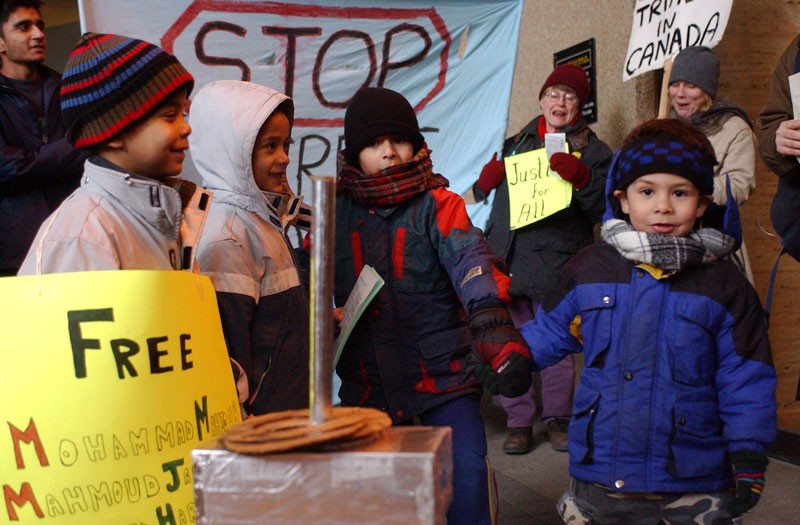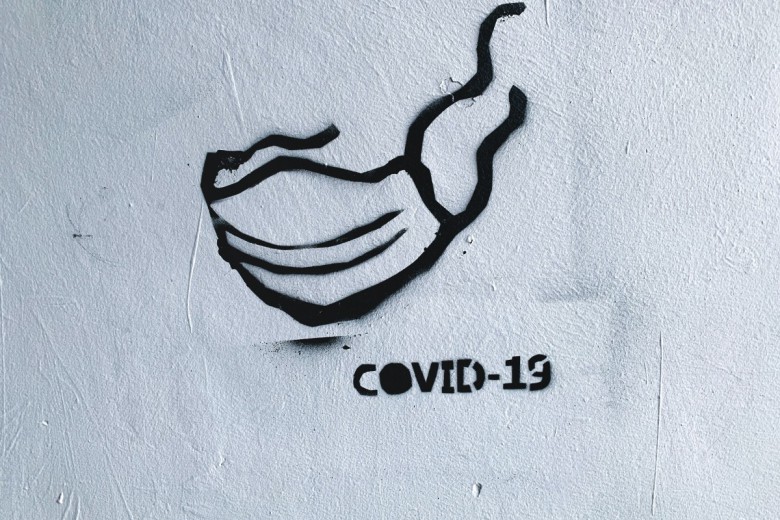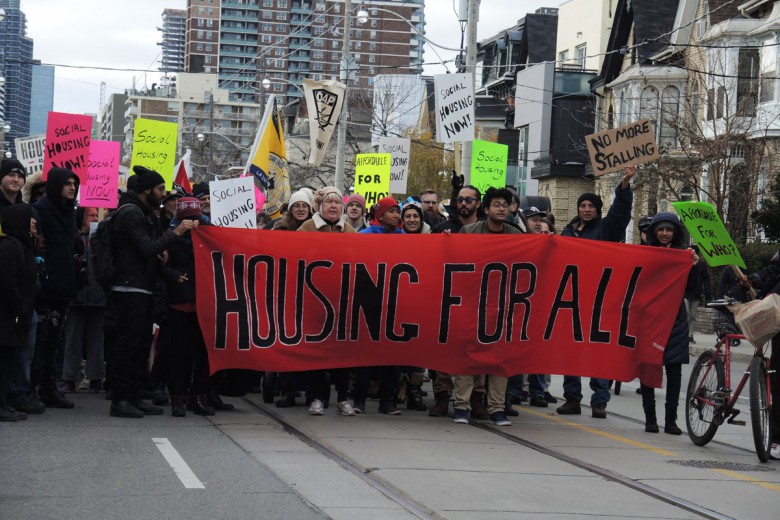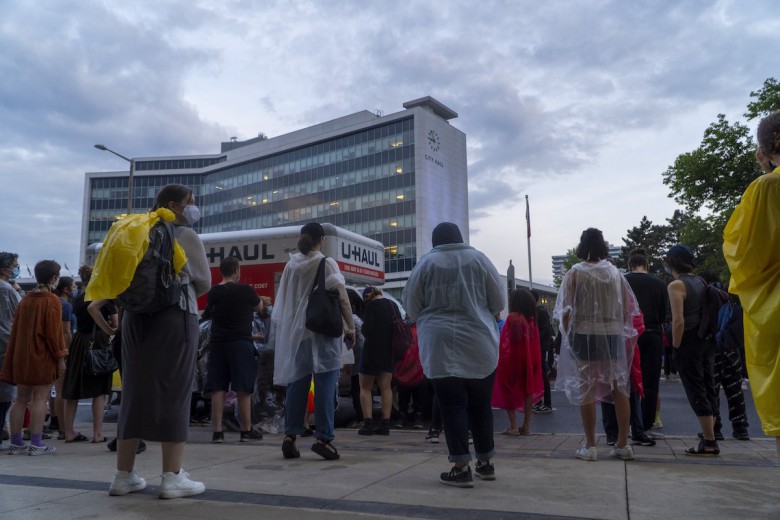
Public outrage over the treatment of Canada’s “security certificate” detainees has receded with the seemingly good news that four of the five detainees are now living at home. But the reality of house arrest is almost worse, because it effectively extends the almost total loss of freedom the men endure to their wives, children and friends.
Imagine the government has declared you a threat to national security, but you’re not allowed to know why. You spend upwards of seven years behind bars under a secretive, arbitrary process reminiscent of a Kafka novel. You watch your children grow up through thick glass in weekly intervals of 20-minute visits, unable to hug and kiss them. Your life is haunted by the threat of deportation to torture.
After all this, the prospect of house arrest might sound like paradise. But even this improvement in your condition becomes a nightmare under some of the most draconian bail conditions ever seen in Canada.
You have a large device affixed to your leg that is linked to a GPS satellite, tracking your every move. To charge the device’s battery, you must sit plugged into an electrical outlet for two uninterrupted hours a day. You cannot sleep during the charging because if you turn the wrong way you might upset the delicate pins in the device.
Video cameras and alarms are placed in your home at all entrances and selected windows, and you must ensure your residence has a parking spot for the government agents who are charged with your 24-7 surveillance. All of your phone conversations, including those with your lawyers, are monitored and recorded for analysis by counterterrorism officials. All of your mail, from bills to birthday cards, is intercepted by state agents who make duplicates of it so that special “counterterrorism analysts” can determine whether your partner’s Sears bill reveals any “trends” or “codes” that might be deemed detrimental to national security.
What sounds like a dystopian sci-fi stomach-turner is in fact a growing trend in Canadian state surveillance of individuals who seek bail in certain high-profile cases, especially those subject to security certificates.
For almost two decades, security certificates have allowed for the indefinite detention of refugees and permanent residents on undisclosed national security grounds and, although declared unconstitutional by the Supreme Court of Canada in 2007, they remain in place with minor modifications.
This Star Chamber-like process has made Canada the subject of criticism from numerous United Nations bodies, as well as Amnesty International, Human Rights Watch, and members of all Canadian political parties. But public outrage over the certificates and especially the conditions under which the detainees have been held (some spent years in unheated solitary confinement cells) has receded with the seemingly good news that four of the five detainees are now living at home.
But the almost total control exercised over every aspect of these men’s lives while in jail – men who have never been convicted of any crime – has now been extended to their family members, their court-approved supervisors and any friends who venture to visit or call.
There has been little media coverage of the insidious manner in which the bail conditions can turn a simple trip to the corner store for milk into a complicated process that requires delicate negotiations with state agents along with the constant fear that a simple error (perhaps going to the wrong corner store) could land you back in jail. Nor has there been much documentation of the devastating psychological and physical impact on all those whose lives are touched by these conditions.
“When my Dad was coming out, I thought life was going to be easier, we were going to actually be a proper family,” says 15-year-old Afnan Jaballah, whose father, Mahmoud, has been targeted by CSIS since the late 1990s. “But looking at it now, it’s pathetic and hard. We haven’t done anything wrong. We’re not terrorists. We’re not anything. We’re just normal human beings following our religion. Nobody should be following us. Nobody should be looking at us.”
Afnan describes the difficulty of having friends over, given the video cameras placed on the outside of their home and the fact that friends who do accompany the family on government-approved public outings find they are constantly followed by Canadian Border Services Agency (CBSA) officers who wear bullet-proof vests, sidearms and dark glasses. “Some friends, when they see this, they get scared and don’t bother coming on outings with me. I’m losing my friends. It is really hard.”
This typical Canadian teenager, like others in security certificate families, feels that she herself is being punished, and is becoming socially isolated because of the secret allegations against and overt surveillance of her father.
It’s enough to produce a rift in the closest of families. Anyone familiar with the potential stress of planning a weekend trip to an amusement park or mall with a group of children and their friends might begin to appreciate the problems likely to arise when such trips must be approved a week in advance since the friends’ parents need state permission to meet your husband. In addition, the trip is subject to rigorous route restrictions (no unplanned bathroom breaks or donut shop excursions), and you will be followed by CBSA officers in a manner that makes all members of the group feel like they’re featured guests on America’s Most Wanted.
“Right now, I hate the word “˜outing’ because of what is happening,” Afnan’s brother, 13-year-old Ali Jaballah, told a Federal Court judge last fall. Since the age of five, Ali has hoisted picket signs and distributed flyers in attempts to have his father released. Having grown up in the glare of media lights, he longs for private time with his family. But when he leaves the house with his father, he is constantly watching the agents who are watching him, and instead of enjoying a playground on a summer’s evening, he is incessantly asking what time it is, fearful they might miss his father’s 9 p.m. curfew. “I’m just worried they might take him back [to jail],” Ali says.
While each detainee is allowed a certain number of outings per week, all must be pre-approved at least three business days in advance. Outings are sometimes rejected without a reason given, though certain patterns have emerged around restricted access to locations that may be host to a high number of Muslims. Indeed, requests to attend Muslim Day at Canada’s Wonderland and the annual Eid gathering at Toronto’s Rogers Centre were rejected, while requests to go to crowded shopping malls have been approved. Mahmoud Jaballah reports that a visit to his daughter’s public high school parent-teacher night was approved, but his request to meet teachers at his younger children’s Islamic school was turned down.
None of this is called for in the court’s bail orders. Neither are the arbitrary decisions that have been made by CBSA, such as requiring pre-approved individuals to provide 48 hours notice of a visit, forcing said visitors to sign a jail-like log book or indefinitely cancelling any and all outings for a period of time for undisclosed reasons.
Detainees and their loved ones question why intrusive, eyes-on surveillance is necessary, especially when court-approved “supervisors” for the men, usually their wives, grown children and close friends, have already been tasked with monitoring the individual’s compliance with their conditions.
While officials with the CBSA maintain these are simply additional measures to ensure compliance, a formerly secret CBSA manual released in Federal Court this past February contradicts such rationalizations, revealing a very specific policy that uses house arrest as a cover for intelligence gathering.
Entitled “Security Certificate Case Monitoring,” the manual provides a skewed view that would likely scare and confuse CBSA officers tasked with following the detainees. Indeed, with headings like “There is no zero risk situation,” the manual repeatedly states that these individuals have “links to terrorism,” a specious and defamatory allegation that has never been proven in a fair and legal process.
Another bold-faced heading states, “National security must not be compromised.” Given that no rational discussion follows about what this means, coupled with the manual’s broad definition of risk – “the chance that something bad will occur” – it’s no wonder that CBSA officers come across as paranoid and unnecessarily harsh.
Under a section entitled “residence check,” officers are told they may enter a detainee’s house to conduct a search but must do so with respect. However, “where there are reasonable grounds to believe that there is a potential risk, officer safety will take precedence over cultural, religious and gender considerations.” Given the sensationalistic manner in which CBSA presents the issue to its officers, it’s likely that officers are never more than a gut feeling away from concluding they have “reasonable grounds to believe that there is a potential risk.” Numerous complaints from detainees about the manner in which such sensitivity considerations have not always been respected support this conclusion.
It was the accumulation of such incidents that led detainee Mohammad Mahjoub to have himself returned to jail two years after his release. No longer able to witness the pain his family was experiencing, he insisted on being returned to the maximum security institution on the grounds of Millhaven Penitentiary built especially for the security certificate cases.
Like Jaballah’s children, Mahjoub’s kids have also been traumatized by the state’s handling of their father’s bail conditions. Violating the sanctity of the place often considered safest – home – can have profound and lasting effects on kids, as when Mahjoub’s children came home one day last summer to discover that their new Wii had been seized by CBSA officers while they were out. The explanation was that the game may have an Internet-capable connection (about which no one in the family was aware). One of his bail conditions prohibits Internet access for Mr. Mahjoub.
Mona Elfouli, the children’s mother, explains, “You could see how angry and screaming and crying the kids were. Why did they do that to us? They don’t let us have any fun at all. They take anything that we enjoy.” The family’s efforts to have the game returned, promising to keep it in a locked room that Mr. Mahjoub could not access, took over six months.
A short time after losing their Wii, the Mahjoub kids purchased a pet snake. The next day one of them refused to go to school, acting out and crying constantly. Eventually, as Ms. Elfouli relates it, “he said he didn’t want to come back from school and see that his pet was gone. He was afraid the CBSA would take it.”
Ali Jaballah and his mother, Husnah Al Mashtouli, demonstrate to clear the name of their loved one, detainee Mahmoud Jaballah, in Toronto.
THE MAHJOUB AND JABALLAH families no longer host the gatherings of friends that once marked their lives. Individuals wishing to be approved as visitors must provide personal information, including the name and address of their employers, as well as a picture (the idea of which must send shivers of fear throughout the Muslim community, where targeting based on false information or the loosest of guilt-by-association allegations can have devastating consequences). Given that all information collected by the CBSA goes onto a central anti-terrorism database in Ottawa, there is no telling with whom the information is subsequently shared, either within the Canadian government or abroad. The recent cases of Abdullah Almalki, Muayyed Nureddin, Ahmad El Maati and Maher Arar, all Canadians tortured abroad based on false and inflammatory allegations by CSIS and the RCMP, are cautionary tales for a community that is targeted and harassed by those very agencies. (See Lorne Brown’s review of the book Dark Days in this issue.)
While some might dismiss such fears as paranoia, the CBSA document illustrates just how well-founded they are. The section on phone taps states that “telephone monitoring can also be a valuable source of information on the ISSC [individual subject to security certificate] as well as their supervisor and associates” (i.e., their friends, none of whom are subject to security certificates but all of whom are now the subject of investigation).
The CBSA document then states that telephone taps are “most beneficial after a catalyst event, such as a residence search, interview, spot check or interactions during an outing or appointment. These occurrences, along with what the ISSC says and who they say it to, could be valuable information that leads to additional targets.”
Additional targets? In essence, house arrest becomes a huge fishing expedition for the government. “Even when a breach of conditions is not apparent, the information may be beneficial for intelligence purposes,” the manual notes, adding, “Where possible, monitoring officers should attempt to gather intelligence for use by headquarters, the regions and other government departments.” Who knows where this “information-sharing” ends or the degree of harm that may come to individuals who could suddenly find themselves on no-fly lists, rendered to a third country or denied employment for mysterious reasons, all because of the secretive actions of overzealous, racially profiling agencies like CBSA, CSIS, the RCMP, Foreign Affairs and the Department of Justice?
Both Mahjoub and Jaballah, as well as Mohamed Harkat (in Ontario) and Adil Charkaoui (in Quebec) have challenged such conditions, with Charkaoui successfully having most of them eliminated after four years of having to be accompanied everywhere by his mother or father. In the Ontario cases, however, judges have shown a great deal more deference to the government and its secret information.
A detainee knows that indefinite jail time will result from any breach. Yet if the government commits any violations, there is no penalty. This became clear when it was revealed that CSIS, one party to these proceedings, had been listening in on two years’ worth of solicitor-client phone calls at the request of the CBSA, a clear and well-understood violation of one of the bedrock principles of a democratic justice system.
While the Federal Court did issue an order calling on CSIS to stop listening to such calls, the judge hearing the case stated: “I don’t want to hear any more about it. It is done. It is over. It is finished. It has happened. We understand it happened. It is unfortunate, but there is nothing we can do to change the past. We can only look at what goes from here in terms of where it will go from here.”
But what role did those illegally obtained solicitor-client phone calls play in padding CSIS’ accusations against the detainees, their families and their friends? Where does the cycle of illegality and impunity end?
It is against this backdrop that all of the detainees and their families are preparing for the next stage in their long struggle to clear their names. Throughout 2009, “reasonableness” hearings will be taking place both in public and, without the detainees present, in parallel secret hearings in order to determine whether the security certificates will be upheld. This two-stage process leaves some wondering whether the public hearing is simply a show trial designed to give the appearance of fairness. While the new process allows for security-cleared lawyers to test some of the secret case evidence, they cannot speak about what happens behind closed doors, even with the detainee, nor are they allowed to cross-examine the government’s confidential informants, leaving the defendant no closer to knowing or being able to contest the case against him.
The stress of preparing for and attending such hearings – which will ultimately determine whether the detainees will be deported to torture, relegated to indefinite house arrest based on secret allegations they can never properly answer, or simply released – is difficult enough. To mount such a defence while dealing with the intricacies of house arrest and constant surveillance presents an almost incomprehensible challenge.
For the Toronto families, it has been a never-ending challenge to raise healthy, happy children in such an environment. As Mona Elfouli recently told a Federal Court judge:
“I brought my kids up to love everyone and to be there for everyone, and not to fear anyone and not to be angry at anyone. But my kids are growing up now, with the situation that we are in, because of the surveillance, because of coming in and taking things from them and making their life miserable, they started to say, “˜I hate CBSA.’
“I say, “˜Guys, you know what? We love everyone. Don’t say you hate them. Say, I hate their action. I don’t like it, and we can talk to them and get them to change it.’ When their dad was in detention, at the beginning they were small; they didn’t know. At the time, I wanted to explain to them. I said, “˜You know, you’re old enough to understand that your dad is in jail, and that’s not because he has done something wrong. It’s just the government are human beings and they sometimes make mistakes. And we talked to them [the government] and tried to help them to correct their mistake, and when it is corrected, your dad would be home.’
“It took a long time after I said that, and the children, I was afraid they wouldn’t trust what I said anymore. But then, their dad came home. And I said, “˜See, guys, we were able to make it.’”
Elfouli promised her pre-teen children that the same relentless persistence that brought their father home after seven years in jail will eventually end the house arrest that disrupts their daily lives. This past March, though, the family had had enough. Facing two impossible choices, the family decided to revoke Mr. Mahjoub’s bail and return him to prison. Elfouli is relying on opponents of security certificates to ensure another seven years don’t pass before their family can live under one roof, free from harassment and state control.





_copy_780_520_90_s_c1.jpg)
